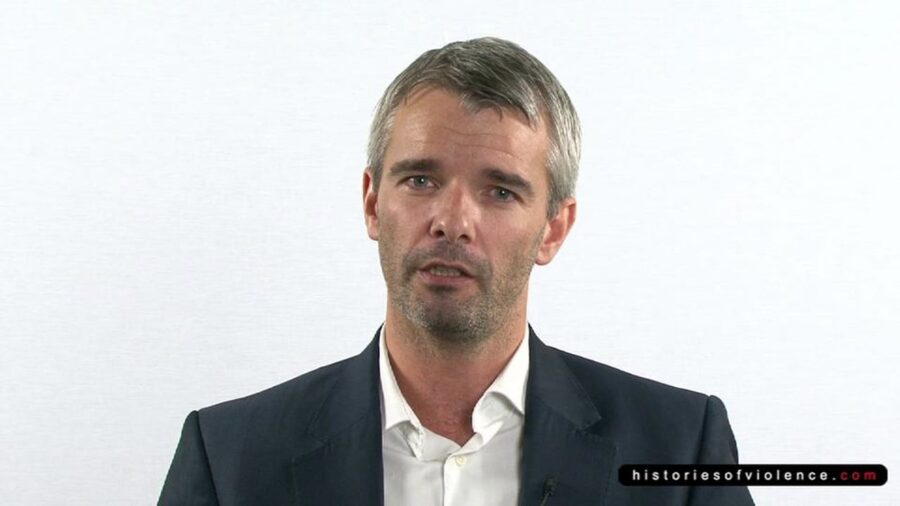Brad Evans: A decade on, the violence of September the 11th, 2001 still haunts the liberal imaginary of threat. And I guess by this what I mean is that the violence of that fateful day now underwrites all forms of liberal security governance, globally. And I think this in many ways is of course understandable. And I personally find myself sometimes deeply troubled by that fateful predicament faced by those people who decided to take their own lives on that horrifying day. However in spite of this, I think our response represents nothing short of a profound failure of the political and the philosophical imagination.
Now, I’m not really subscribing you to some discourse which aligns the post‑9&zwj/&zwj11 moment with a US quest for hegemonic global domination. I think such analysis is very much tied to an outdated geostrategic past. What really concerns me is in the post‑9&zwj/&zwj11 moment how the war effort has been mobilized and tied to a Kantian-inspired liberal ethics.
Now, I guess in orthodox narratives and very much in the Anglo-American political tradition, the Kantian ideas are very much dominated by concerns with perpetual peace, global security, rights, and justice for all and so forth. However, for me, beneath the weight of this architecture and this well-established narrative it’s possible to identify a much more central and indeed sinister logic which is central to me to the Kantian schematic, and that is that political difference is a problem to be solved.
Now, what I think looking at the problematic of Kantian-inspired liberalism in the post‑9&zwj/&zwj11 moment, I think what we really come at is the fundamental difficult relationship between liberalism and the other. Now, if we look I guess the problem of the other in terms of I guess how political theory broaches the problem, political realism has a well-established relationships with others. Namely, they have to be kept at the borders. We keep the the others outside of the line. In other words, otherness is a phenomenon which is epiphenomenal. It’s something which exists so-called out there.
For liberalism, of course, there’s a different relationship to others, intellectually and geographically. In order for liberalism to augment its global imaginary, others need to be incorporated. And this of course seems very idealistic. However, the history of the liberal experience shows that others are never incorporated as universal subjects endowed with inalienable freedoms. Otherness always proceeds on the basis that the other is somehow dangerously unfulfilled. They’re even a problem unto themselves.
Now, I think this has a number of telling implications for the way we understand liberalism and certainly its ethics. First of all I think if we can argue that otherness is the central formative principle for liberal regimes of power, then otherness conditions the very possibility of liberal rule globally. Indeed we have to deal with the problem of otherness as certain discourses such as war by other means tell us today.
Secondly of course, the other [you?] does not figure as a juridical subject. But the other is opened up to an entire sophisticated array of political economizing assays which is predicated on certain degrees of advancement or backwardness; civilization or indeed savagery. And hence it’s for this reason that I would argue that the ruling principle, what we could call the transcendental principle for liberal power, is not law but is something on the order of a divine economy of life itself.
So I guess what the problematic which I’m really trying to come to grips with today, and I think this is the most crucial problematic that we face in the 21st century, is how can we have better ethical relations with others in a world of radical interconnectivity. And to me the answer has to lie beyond liberalism. Liberalism will not provide us with the answers that we’re searching for.
Now, of course in the post‑9&zwj/&zwj11 moment, anything which appeared to be of a postmodern or poststructural ilk was routinely condemned. And indeed intellectually challenged for being either weak on the causes of terrorism, or indeed too abstract, or indeed too esoteric. Or some liberals of course would argue that its culturally relativist. I think it’s quite easy to dismiss any of those arguments. And I think what I’m trying to gesture towards in terms of better ethics towards the other is something which is not abstract or esoteric, but it does require perhaps a different orientation, different political coordinates. And we can of course find certain refuge in the very principle of philosophy in itself. Which if we go back of course to the time of the Greeks, philosophy was very much of the order of friendship. It was a search for friendship amongst living subjects.
Whereas if we turn to the continental shift in understanding of the political, that of course would argue that the political is precisely the affirmation of difference. It doesn’t see difference as a problem to be solved. It doesn’t see difference as something which stands in the way of global security, peace, and prosperity. Indeed it’s only by affirming difference that we could even possibly begin to imagine living alongside one another in a world of radical interconnectivity.
So hence I think the fundamental challenge that we do face in the 21st century is an attempt to reconcile this notion, this philosophical notion of friendship, with a concept of the political which is linked to an affirmation of political difference.
